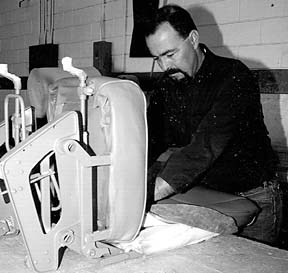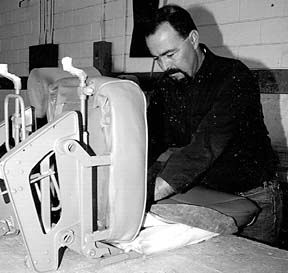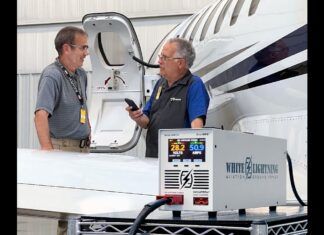
Are you $%@#%# guys living on the same planet as I am?
Were happy to say we don’t hear this sort of thing from readers often but when we do, its usually because some product or service weve recommended hasnt worked out the way we were sure it would.
Welcome to the real world of variable perceptions, where the term satisfaction is a moving target and what one aircraft owner considers good service and a swell deal, another considers the bum steer of a lifetime.
If there’s any constant truth in buying aviation products and services, its this: Even the best of service shops, those with sterling national reputations, arent capable of satisfying everyone everytime. Moreover, some shops seem to deliver for most customers, but have underlying customer service polices that make them a poor choice, in our view.
An example of the latter is an upholstery shop we recommended in our February, 1999 issue, Interiors by Steve, in Myrtle Beach, South Carolina. Based on several good recommendations from readers and no complaints-not to mention a visit to the shop ourselves-we placed this shop on our top-rated list.
In the interim, two complaints against Interiors by Steve-one we consider egregious-have caused us to reconsider. This shop isn’t alone in providing what we consider to be uneven services so we’ll use it to shed light on what you as an owner should consider acceptable practices in the industry.
Deal Gone Bad
The first and most serious complaint against Interiors by Steve came to us in September of 1999, nine months after our article recommending the shop was published. Reader Phil Bowie of New Bern, North Carolina, contacted the shop owner, Steve Hardwick, to request a quote on an interior. Bowie planned to have his 1968 Cessna Skyhawk painted by nearby Flight System, Inc. at the same time.
Consistent with his stated policy to us, Hardwick quoted a $5900 fixed price for a fabric interior redo. Bowie coordinated a date with the paint shop and Hardwick agreed to an early May start to strip the Skyhawks old interior before sending it to the paint shop. After painting, the airplane was to be returned to complete the interior. At the deposit phase, according to documentation Bowie provided to us, Hardwick accepted a $3000 deposit but informed Bowie that because the fabric and materials he selected were off-the-shelf items, no materials would have to be ordered. Further, according to Bowie, Hardwick said he expected to have leather left over from a corporate aircraft and might be able to use that in the Skyhawk at no additional charge.
No Response
The trouble began almost immediately when the paint shop lost the color chip and asked for a replacement. Bowie contacted Hardwick to send an interior color swatch for matching purposes and the paint shop made the same request. Numerous calls and requests went unreturned and by the end of May, Bowie selected a paint color without a matching interior swatch.
Because the schedule had slipped, Bowie contacted Hardwick and suggested that the job be rescheduled for a later date and he requested a return of the $3000 deposit. Hardwick agreed but said he would have to first reinstall the old interior. (As it turned out, the old interior was never removed, and when Bowie asked about this, Hardwick said he was mistaken.)
Hardwick promised to return the deposit and although Bowie followed up with numerous calls and faxes, the money was not returned. On June 22, Hardwick insisted he had returned the money via check but when Bowie followed up, Hardwick said it was lost in the mail.
Bowie continued to call through July and August and at one point, Hardwick promised to get a loan to return the deposit and to call back when it was approved. None of this transpired, even by Hardwicks admission to us. As of December, with the deposit still unreturned, Bowie was preparing legal action.
More Trouble
The second complaint, although less egregious in our view, is no less irritating for the owners. Based on our recommendation, John and Rachel Duell flew their 1976 F33 Bonanza from Long Island to Myrtle Beach in early April to have its interior redone, with a delivery date of April 28th promised. The Duells followed up during the month of April, during which Hardwick said he needed a few more days to get the job done.
After numerous promises, Duell flew to Myrtle Beach to pick up his airplane. He arrived to find the shop hurriedly assembling the interior and he also noted significant squawks, including a mis-installed rear seat and overhead vents, a different seat insert material than had been agreed to and missing exit placards and shoulder harness cap covers.
Although displeased with the detail work, Duell flew the aircraft home and fixed most of the squawks himself. As of mid-December and despite numerous promises from Hardwick, Rachel Duell told us the missing items had not been sent to them. She also told us Hardwick had claimed to have sent the items via FedEx and provided a tracking number. Checks with FedEx revealed that the tracking numbers were never recorded in the system. (Rachel Duell took the trouble of actually putting Hardwick on a conference call line with FedEx.)
Hardwicks Reply
Both Bowie and the Duells provided us with detailed records of their dealings with and complaints about Interiors by Steve. In mid-November, we contacted Hardwick and faxed this material to him. He agreed to reply within a week. By mid-December, Hardwick had still not contacted us so we phoned again.
He promised to send a reply by express carrier the same week, but it never arrived. Nonetheless, we asked Hardwick for his side of the story, which turned out to be brief.
As for Bowies deposit, Hardwick claimed the customer misunderstood his agreement and that the deposit was necessary to pay for stock materials that would still have to be ordered. When we asked if such materials could expected to be used in future jobs, Hardwick said they would. However, he said he planned to withhold Bowies deposit until the materials were committed to another job. When asked why he claimed the check had been sent back to Bowie, Hardwick said he didnt recall having promised to send the money. According to Hardwick, he was under the impression that Bowie knew the materials would have to be used before the deposit was sent. (Obviously, Bowie has a different impression. As far as we know, no written agreement was executed clarifying these provisions.)
As for the Duells, Hardwick told us he thought that they were satisfied with the work done on the couples Bonanza and he confirmed that the exit decals and harness caps hadnt been sent. When we asked why, he said he was waiting for the Duells to contact him with an address. This, of course, is at odds with his claim of having sent the items via FedEx.
Our View
Obviously, both Bowie and the Duells are unhappy customers. In our view, the Bowie case is more egregious, since it involves a substantial amount of unreturned money and, more troubling, a lack of response on Hardwicks part. The larger question is whats a reasonable deposit policy? Should a shop withhold a deposit or a portion thereof if the job is cancelled or otherwise turns sour?
We checked with a few other shops whom weve never heard complaints about. Our impression is that a reputable shop should expect a portion of the payment in advance, both to hold a definite date for the work and as good faith deposit for materials purchase. What size deposit is appropriate? The smaller the better, in our view, unless you have direct personal experience with the shop or someone you trust does.
The shop may request half of the money up front but that sum ought to be negotiable, if youre uncomfortable with it. A shop that needs that much up front strikes us as having a cash flow problem that could become a problem later. A 15 to 20 percent deposit on a $6000 job is fair for both parties. Under no circumstances should you pay the entire amount of a paint, upholstery or avionics job before the work is completed. If the work turns out to be unsatisfactory, you’ll have little leverage if the shop decides to dig in its heels on fixing squawks.
The reasonable exception to this is engine exchange or avionics bought outright. These often require payment in full before shipment and since this is a conventional over-the-counter or mail purchase arrangement, the usual caveats apply, and so do the usual consumer protections. If you can charge such items, the credit card company will often intercede in a dispute over quality or delivery. (Despite huge volume in mail order avionics, weve heard few complaints in this area.)
If a service job such as paint or upholstery hits the skids and is thrown so far off schedule that either the shop balks or the owner decides to cancel, who pays? If the shop balks-rare, but it happens-you should expect to get your entire deposit back, no questions asked. The shop eats whatever materials it purchased.
In Phil Bowies case, because of uncertain coordination between the paint and interior shops, he pulled the plug. In our view, the shop is entitled to keep a portion of the deposit as a restocking charge. We would expect this to amount to no more than 10 or 15 percent of the total job cost or about $800 tops on $5900 job. The better shops may consider this as a written policy but will in fact charge the customer less or nothing at all, in the name of good public relations.
Hardwicks insistence on retaining $3000 until he sells off material is unacceptable, in our view, and a poor customer service policy. Although Hardwick is capable of good work-weve seen several examples-his lack of responsiveness in both cases is reason enough to skip this shop for interior work.
Other Ethical Issues
Shortly before Phil Bowies complaint arrived, we received a phone call from a reader given a quote for a paint job in the spring, with a shop date in late fall. Shortly after issuing the quote in writing, the shop notified the owner by mail that it could no longer honor the price. The stated reason was a precipitous increase in workmans comp insurance premiums and the customer was offered a new price, some 20 percent higher than the first quote.
Fair or not? While were not happy about it, we advised the customer that the shop acted ethically. In this case, the written quote had no fixed period, although most are accepted to be valid for 30 to 90 days, unless otherwise noted on the contract.
While its unfortunate that the shop had to withdraw its price, we think its better that it do that before the work begins rather than presenting the customer with a larger invoice. This gives the owner ample time to consider the new offer and shop elsewhere for a better price, rather than paying an unexpectedly higher invoice under duress. This sort of thing illustrates the problem with fixed-price services in aviation. They often arent fixed prices at all, but have add-ons caused by customers who request changes while the work is being done or by shops who lowball the quote and surprise the owner when the work is done, holding the airplane hostage against payment.
To avoid heartburn in this situation, ask what the fixed price covers and resist the urge to change details as the job progresses. If you do order changes, find out if theyll cost more and how much more and get a confirming fax, if you have doubts.
If youre working with a handshake deal-not always the best idea but sometimes it works-be clear on what the handshake covers. Its far better, we think, to get a written proposal with the shops price and specs clearly described. you’ll need that if you wind up in court, as some disputes inevitably do.
Also With This Article
Click here to view “About Our Shop Recommendations.”


